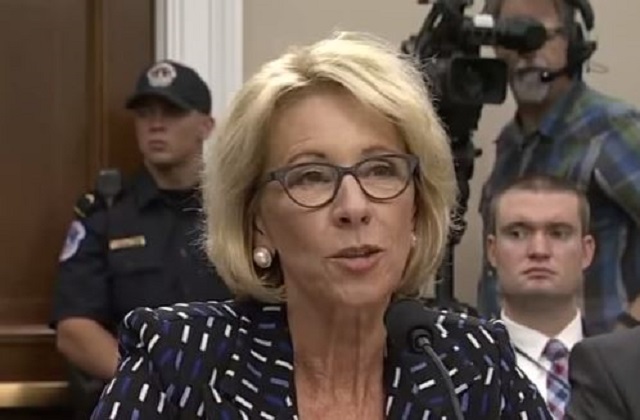 Education Secretary Betsy DeVos is at it again, as she makes her latest move to unequivocally prioritize greed over education. When last we left Betsy, she was refusing to commit to enforce the Gainful Employment Rule against for-profit colleges. That’s the rule that prohibits fraudulent “colleges” and “universities” from swindling students with deceptive practices to get them to plunk down student loan money. Or in other words, exactly what Trump University is accused of doing.
Education Secretary Betsy DeVos is at it again, as she makes her latest move to unequivocally prioritize greed over education. When last we left Betsy, she was refusing to commit to enforce the Gainful Employment Rule against for-profit colleges. That’s the rule that prohibits fraudulent “colleges” and “universities” from swindling students with deceptive practices to get them to plunk down student loan money. Or in other words, exactly what Trump University is accused of doing.
If the Gainful Employment Rule aims to pre-empt the shady, for-profit college problem beforehand, the Borrower Defense Rule aims to do so afterward. That rule, adopted in 2016, allows students to seek loan forgiveness when a school made “a substantial misrepresentation.” In other words, this rule basically says, “as the federal government, we recognize that we really should be making sure that Fraudster U doesn’t get your Stafford Loan money, and since we were apparently asleep at the wheel when you enrolled, we’ve got your back now.”
While there is always much about education that can be reasonably debated, these rules are no-brainers. Everyone from fiscal conservatives to bleeding-heart liberals should be able to agree that we don’t want federal loan money to go to scam businesses parading as colleges. We (and by “we,” I mean, “everyone other than the DeVos family”) wouldn’t support federal funding to buy into Amway, so we shouldn’t be cool with Pell Grants going to these “universities.” As the Obama administration said in its press release in 2016, the Borrower Defense Rule ensures “that students who are lied to and mistreated by their school get the relief they are owed, and that schools that harm students are held responsible for their behavior.”
What happens to the money when a defrauded student invokes the Borrower Defense Rule? It depends. The offending “college” itself will become the primary obligor; when the school becomes defunct, though, the federal government will be stuck with the unpaid loan. Sure, that stinks for taxpayers – which is the main reason why it is incumbent on the DOE to prevent this funding from going to fake schools in the first place.
Now that DeVos is the new top dog of Educationville, though, things are changing. DeVos has decided to single-handedly delay the implementation of the Borrower Defense Rule. And if you’re wondering whether Secretary DeVos and her fraud-tolerant minions followed the necessary legal steps to change implementation of the rule, wonder no longer. They didn’t. DeVos has cited Section 705 of the Administrative Procedures Act as her authority to postpone a duly-adopted regulation when “justice so requires,” – a statement that seriously makes me wonder whether DeVos learned the definition of “justice” at one of the very “schools” we’re talking about here.
Yesterday, eighteen states and the District of Columbia are taking a stand against the DeVos Department of Education for its absurd sheltering of these for-profit schools. The lawsuit was filed yesterday in federal court for the District of Columbia. According to the Complaint, 86% of the revenue these businesses earned in 2009 came from – you guessed it—federal student loans and grants. If that’s not bad enough, throw in the fact that these “schools” have been found to engage in predatory and deceptive sales practices, specifically targeting low-income and minority students.
At issue in the lawsuit will be DeVos’ legal authority for delaying the Borrower Defense Rule, which should be something of a fun battle to watch. While DeVos claims that her power to delay the rule is clear under the Administrative Procedures Act, there’s significant evidence that as of just a month ago, DeVos wasn’t nearly as certain. In June, Politico reported that based on internal documents it obtained, the DOE had, at first, planned to delay the rule using a whole different mechanism; it’s always hard to claim certain authority when it’s clear that you weren’t so certain a short while ago.
This is an opinion piece. The views expressed in this article are those of just the author.